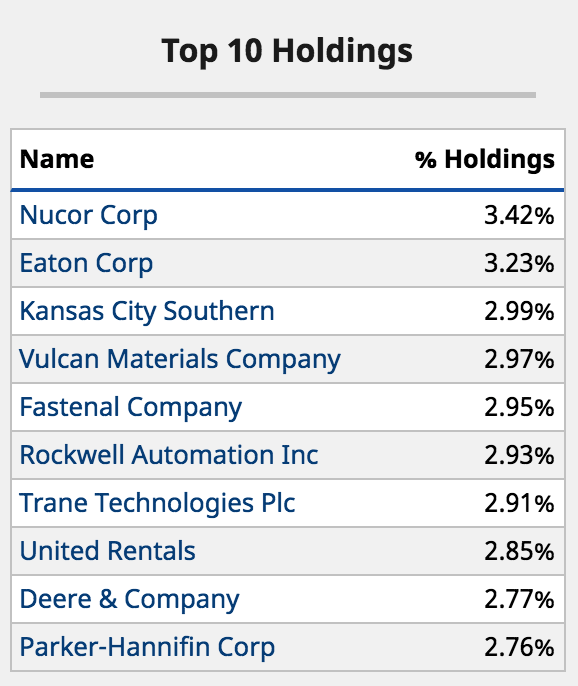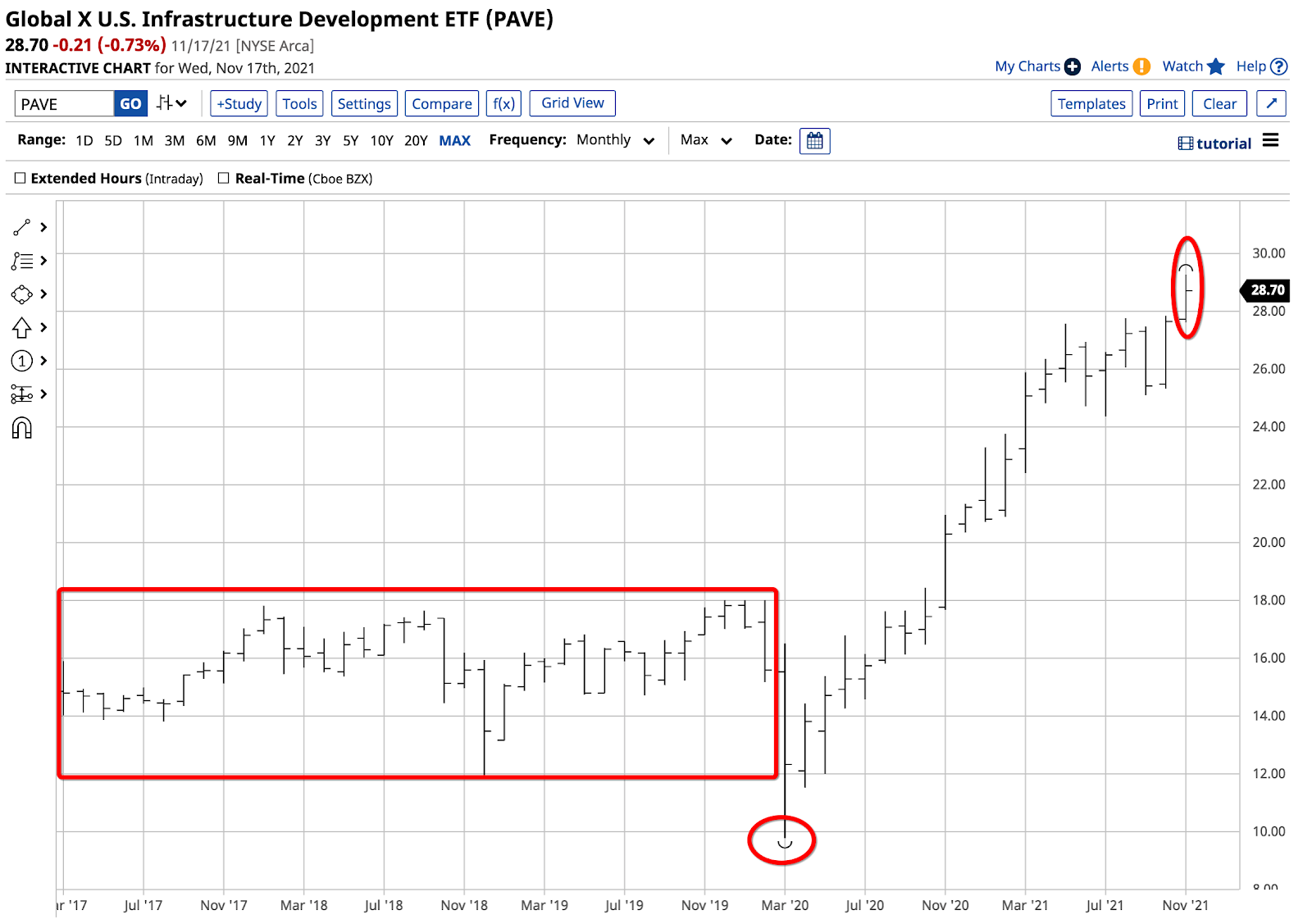Street Calls of the Week
This article was written exclusively for Investing.com.
- Congress approves the infrastructure rebuilding package
- Lots of jobs and contracts on the horizon
- An earnings boom in pick and shovel infrastructure companies - PAVE is an ETF that holds the leaders
- 3 reasons that PAVE will continue to climb over the coming years
- A bullish trend
Industrial commodity prices have been climbing since reaching significant bottoms in early 2020. Since the beginning of the global pandemic, many raw material markets have reached all-time or multi-year highs. Bull markets rarely move in straight lines; corrections can be brutal. Over the past months, China, the world’s leading commodity consumer, has attempted to cool off the bullish price action by selling strategic stockpiles of copper, aluminum, zinc, coal, and crude oil. The selling has tempered some of the bullish price action.
Meanwhile, the world’s central banks’ monetary policy and government stimulus programs have stoked inflationary pressures. While Chinese selling may have slowed the ascent of commodity prices, they remain in bullish trends.
Last week, the United States committed to rebuilding its crumbling infrastructure with legislation that will result in over one trillion dollars of spending over the coming years. Commodities are the building blocks of infrastructure, and the companies that provide goods and services stand to see their earnings grow in the wake of the legislation. The Global X US Infrastructure Development ETF (NYSE:PAVE) holds shares in companies that are pick-and-shovel plays that will benefit from the US program.
Congress approves the infrastructure rebuilding package
On Nov. 15, US President Joseph Biden signed a $1.2 trillion bipartisan infrastructure bill into law. The legislation will put $550 billion in new funds into transportation, broadband, and utilities. The funds will rebuild crumbling infrastructure in roads, bridges, tunnels, railyards, and other areas needing replacement or upgrades. The funding was long overdue as past administrations and Congress negotiated the legislation for the better part of a decade.
Lots of jobs and contracts on the horizon
Rebuilding US infrastructure will create many construction jobs, providing government contracts for companies in the sector. Moreover, since industrial commodities and energy are the building blocks of infrastructure, the trillion-dollar spending will increase the demand for raw materials.
The package will further stimulate the US economy when inflation is already at the highest level in three decades. Commodity prices have increased, with copper and base metals, crude oil, natural gas, coal, lumber, and many other construction essentials at their highest price levels in years.
The US Federal Reserve and US Treasury continue to call inflationary pressures “transitory.” The infrastructure package could make “transitory” last longer as it only exacerbates the issues created by supply chain bottlenecks and pandemic-inspired factors.
Moreover, the unprecedented levels of central bank liquidity and government stimulus since early 2020 continue to fuel inflation, and the infrastructure package will only add to the economic condition.
CPI rose by 6.2% in October, the highest level in decades. Many economists believe that 1970s-style inflation is on the horizon for the US. Square's (NYSE:SQ) Jack Dorsey warned of hyperinflation that rapidly erodes money’s purchasing power.
An earnings boom in pick and shovel infrastructure companies - PAVE is an ETF that holds the leaders
When it comes to the infrastructure package, the Global X US Infrastructure Development ETF product holds a portfolio of companies that stand to benefit from the new legislation. The fund summary states:
The Global X US Infrastructure Development ETF seeks to provide investment results that correspond generally to the price and yield performance, before fees and expenses, of the INDXX US Infrastructure Development Index. Fee waivers (-0.11%) are contractual and in effect until at least Mar. 1 2018.
PAVE’s top ten holdings include:

Source: Barchart
At $28.70 per share level on Nov. 17, PAVE had over $5.377 billion in assets under management and trades an average of over 1.74 million shares each day. The ETF charges a 0.47% management fee. The blended $0.10 dividend translates to a 0.35% yield and offsets some of the ETF’s expense ratio for those holding the product for the coming year or longer.
3 reasons that PAVE will continue to climb over the coming years
The following reasons support gains for the companies in PAVE’s portfolio:
- Construction and equipment companies will be the primary beneficiaries of rebuilding and refreshing US infrastructure.
- An inflationary environment will allow the companies in PAVE’s portfolio to raise prices for government projects leading to increased profits.
- Once the project gets underway, we could see Congress allocate additional funds for projects as $1 trillion is likely not enough to cover the requirements.
Infrastructure rebuilding will take years, if not decades, to complete. $1 trillion is just a starting point as government projects tend to cost a lot more than initial projections. By the time the program finishes, another will likely be necessary.
A bullish trend
The PAVE ETF began trading in March 2017 at $14.84 per share. The ETF traded between $11.81 and $17.99 until March 2020, when the pandemic sent it to a low of $9.77 per share. 
Source: Barchart
The chart highlights that the March 2020 low was the beginning of a rally that continues in November 2021, taking PAVE from $9.77 to the most recent high at $29.26 per share. At the $28.70 level on Nov. 17, PAVE’s trend remains bullish as infrastructure legislation moved from discussion to reality over the past week.
Government spending is likely to keep the pattern of higher lows and higher highs intact over the coming months and perhaps years.
